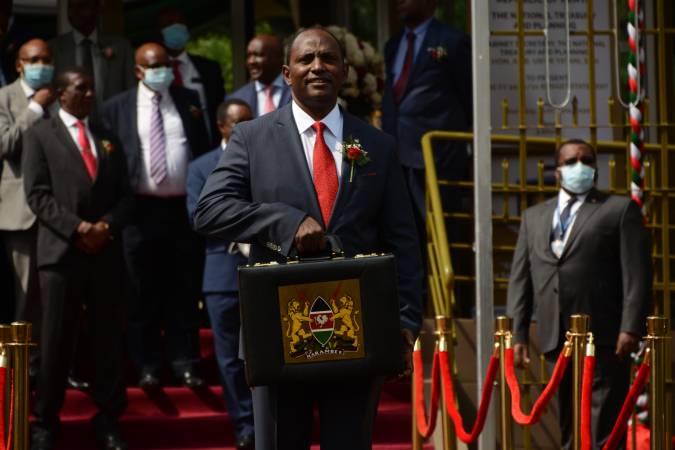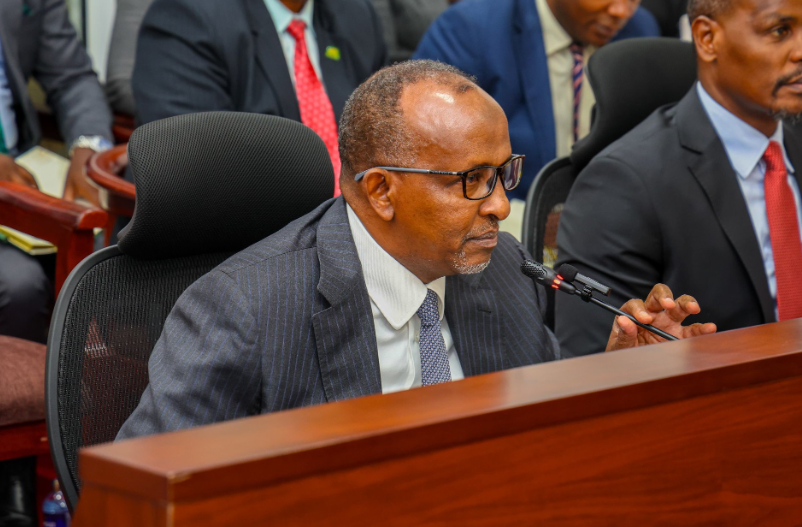Row brews over bid to raise debt ceiling

Jeremiah Kiplang’at
A standoff is looming between the National Treasury and Deputy President William Ruto and the parliamentary budget committee over the government’s push to increase the national debt ceiling to Sh12 trillion.
On Friday, Ruto warned the National Treasury against any attempts to take up more loans raising the stakes further as his troops would be expected to put up a spirited fight against the government plan.
Treasury Cabinet Secretary Ukur Yatani has already written to the National Assembly expressing his intention to ask MPs to approve the request to enable government to borrow more funds to finance some of Jubilee’s flagship projects before its term ends in August.
In a letter to National Assembly Clerk Michael Sialai dated February 8, the CS explained why it was necessary for the upward adjustments of the ceiling, which is currently capped at Sh9 trillion, saying it was to cover the anticipated deficit in the 2022/23 budget that is expected to be Sh3.2 trillion.
“In anticipation of the need to fund increased public expenditure, the National Treasury has taken several steps to initiate the process of amending Section 26 (1) of the PFM (National Regulations). The process is aimed at achieving a smooth transition from the debt limit set by the legal notice No. 155 of 2019 to a new proposal that would accommodate the envisioned deficits funding and best international set standards,” said Yatani.
Sh400b deficit
He anticipates a deficit of Sh846 billion in the next financial year and hopes MPs would accede to his request to amend the law to allow more borrowing.
The current ceiling was set in 2019 when it was moved up from Sh6 trillion to Sh9 trillion.
National Assembly’s Budget and Appropriations committee chaired by Kieni MP Kanini Kega has set the stage for a fight after it ruled out any possibility of reopening debate on the ceiling, asking the CS to work within the existing law. In its report on the Budget Policy Statement, which is the primary document for budget making, the House team said the government must cut the deficit to Sh400 billion instead of doubling it.
“The committee is concerned that the BPS had proposed an overall deficit of Sh846 billion which, if approved, has a potential to breach the approved debt ceiling of Sh9 trillion. It is forecasted that by the end of June 2022 the stock of debt will amount to Sh8.6 trillion which means the only amount available for the next financial year without an amendment of the ceiling would be Sh400 billion. The committee, therefore, recommends that the overall deficit be limited to Sh400 billion,” the committee said in the report.
Ruto appeared to be reading from the same script as the committee as he asked Yatani not to dare add more debt on taxpayers’ shoulders, saying it was time to start repaying loans instead of going for more.
“We are telling the Treasury not to try to increase the debt because we are paying almost one trillion every year to settle debt. We are asking that Kenyans should not be burdened further with debt. What we have is enough, we don’t want more debt, and we want to make a budget with what we have as we settle the debt,” said Ruto in Githunguri last Friday.
Exceed limit
As it anticipates stiff opposition for the plan, the Treasury has sought a legal opinion from Attorney General on the way forward even as it prepares to face its opponents.
In his response on behalf of the AG, Solicitor General Kennedy Ogeto, left the options open, saying the BPS was not legally binding to stop any changes to the law to provide for what Treasury is hungering for.
“In our considered opinion, the question whether or not the debt ceiling as set by Parliament has been or will be exceeded can be answered only at the point of an actual proposed borrowing. It is our opinion that to the extent that the BPS is a statement of intention, the passage thereof does not ipso facto violate the statutory requirement that any borrowing must not exceed a limit set by Parliament,” said Ogeto in a response dated February 8.
He said the BPS was not cast in stone and could be altered at any time including changes to the Act for more loans to be accommodated.
“Indeed, the implementation of the policy objectives outlined in the BPS is subject to various variables, including a change in the law, hence the contemplation of deviations in Section 16 of the Public Finance Management Act, 2012,” Ogeto added.
There is also an ongoing battle whether the adjustment of the ceiling should be done through an omnibus Miscellaneous (Amendment) Bill as proposed by the Treasury or a distinct bill targeting changes to the PFM Act. A miscellaneous Bill normally carries several proposed amendments to various Acts but lawmakers have often treated them cautiously especially if they propose major changes to the Acts.
MPs have been under pressure for a while now from the Treasury to adjust the ceiling through a vote in the House as it seeks extra funds to complete President Uhuru Kenyatta’s legacy projects.
Debt has become a hot-potato issue in the election campaigns as key figures engage in exchanges over how the country should proceed with the ballooning debt.
Amani National Congress leader Musalia Mudavadi, who recently teamed up with Ruto, has been the leading voice in reprimanding the government for its appetite for loans.
“Kenya’s public debt is galloping towards the Shh9 trillion ceiling against a GDP of Sh11 trillion. This means that for every Sh100 of revenue collected, Sh70 goes towards paying debt. That leaves a paltry Sh30 for public salaries, health services, education, security, infrastructure and all those services that fall under devolved governments,” Mudavadi said when he launched his presidential bid last month.











